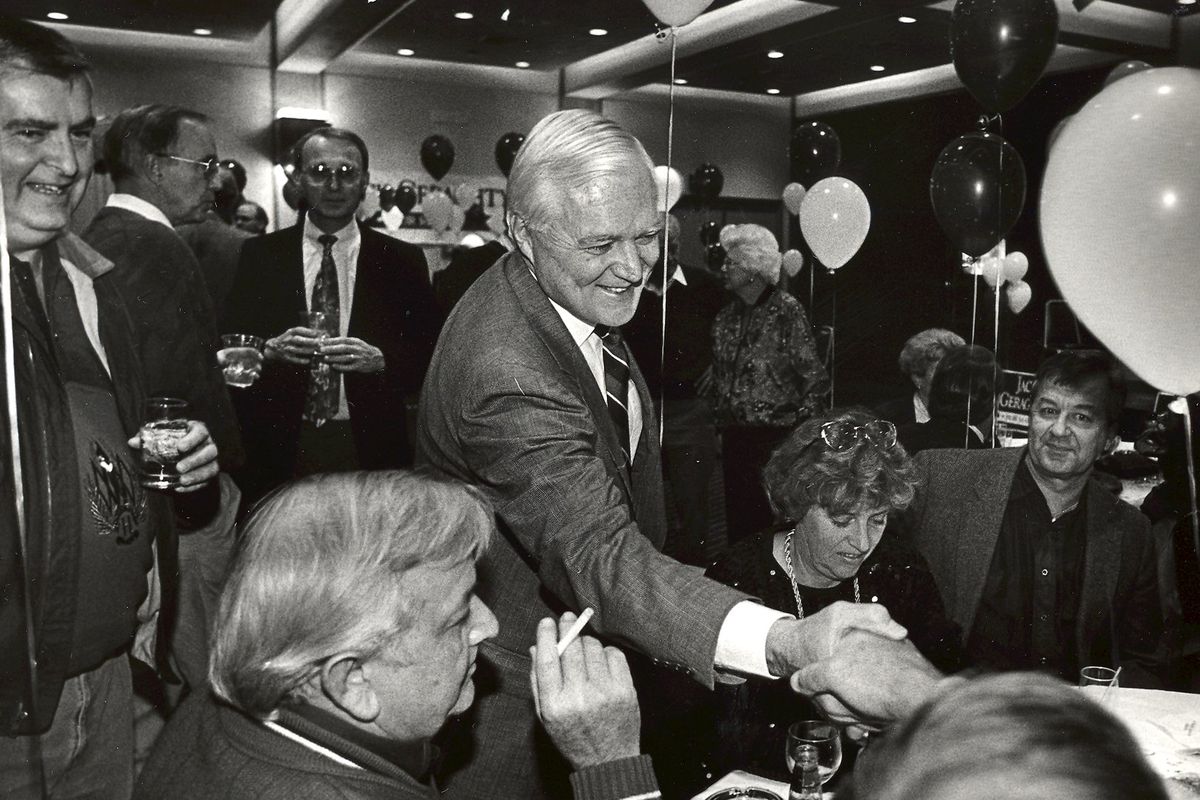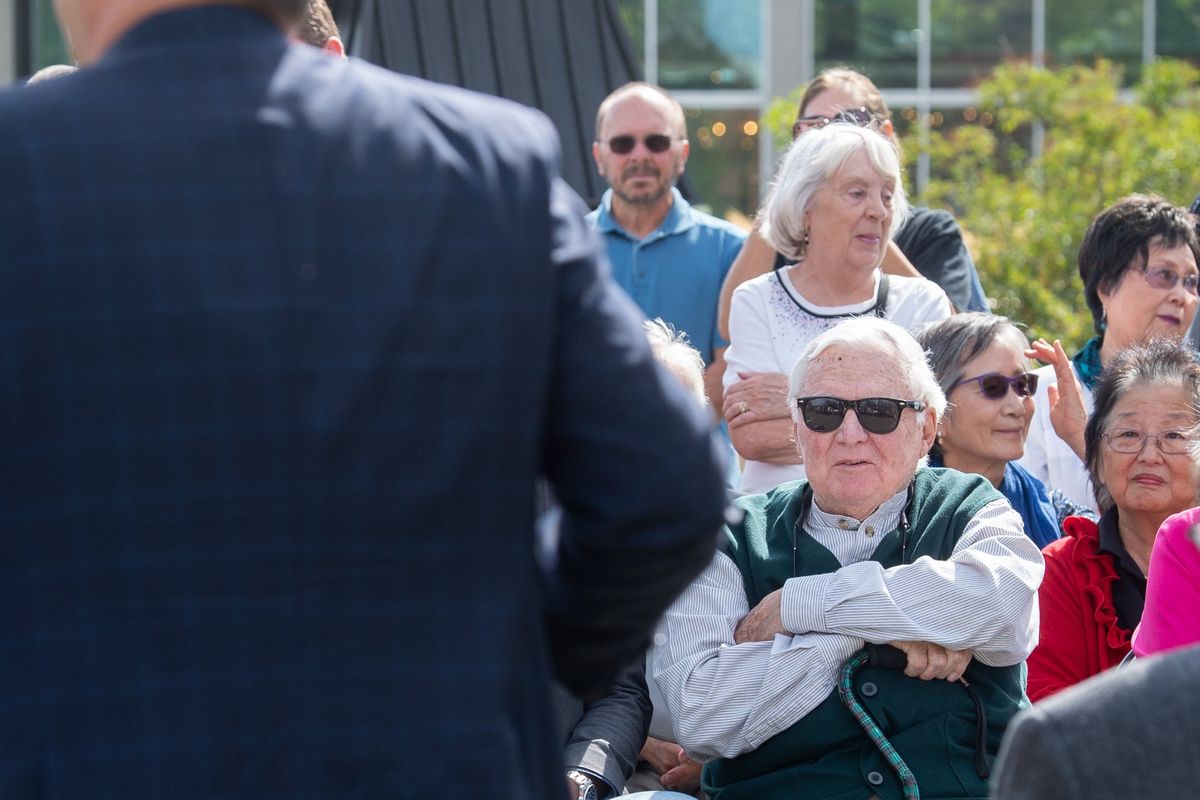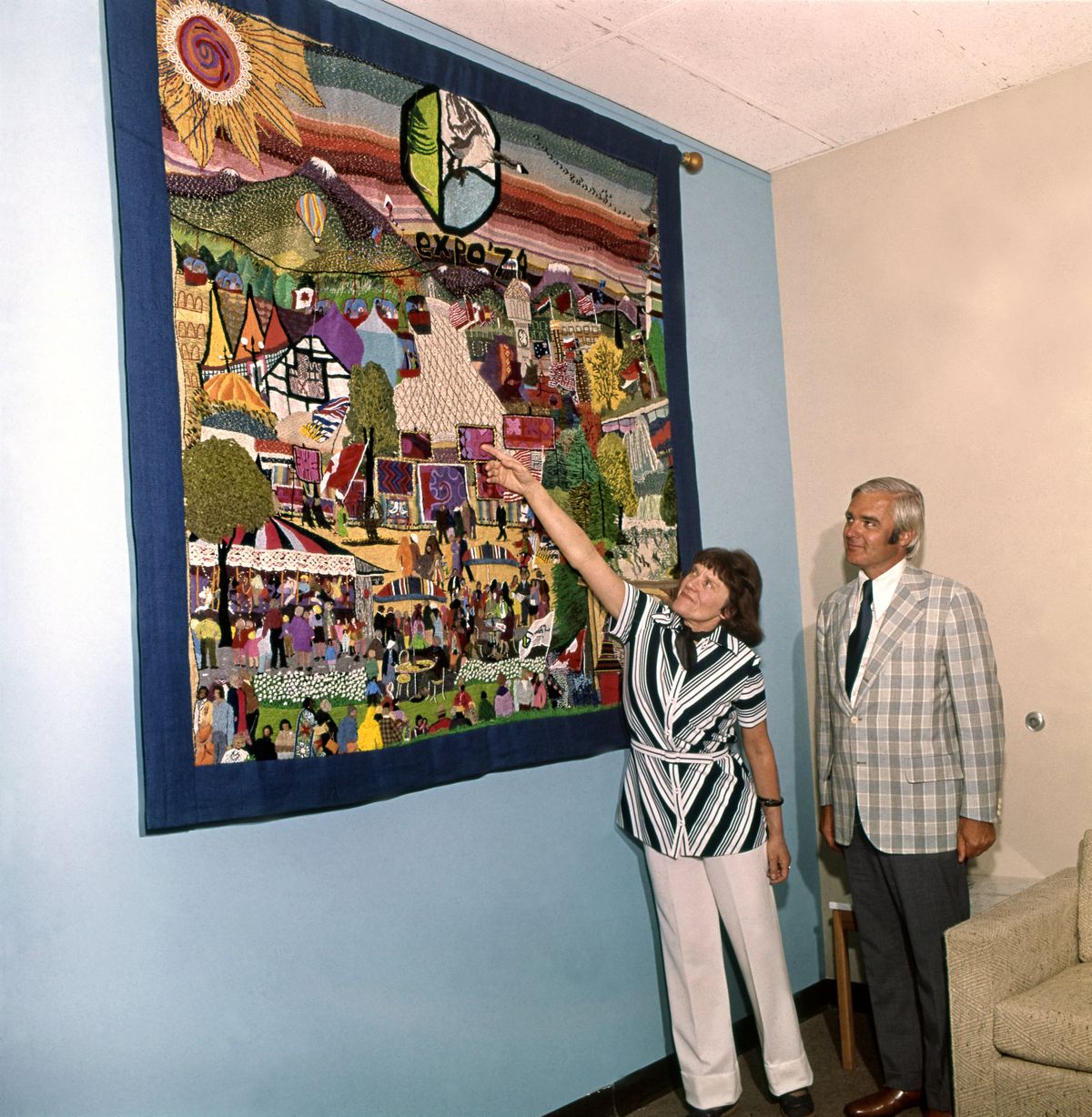Former Spokane Mayor Jack Geraghty dies at 89: ‘He was very committed to the city of Spokane’
Jack Geraghty, former Spokane County Commissioner and former Spokane Mayor, as well as Expo ’74 organizer, listens to Mayor David Condon speak, Friday, Sept. 13, 2019, at the opening of the Sister Cities Connections Garden in Riverfront Park. (Jesse Tinsley/The Spokesman-Review)
Jack Geraghty, who served as mayor of Spokane from 1994 to 1997, died Thursday evening in his home with his family by his side. He was 89.
Before he was mayor, Geraghty was a journalist, public relations consultant and statesman with a deep commitment to the city he called home.
As a father, Geraghty instilled a sense of civic duty in his four daughters, who would be nicknamed the “Charity Geraghtys,” said former City Council President Ben Stuckart, a longtime friend who was inspired into politics by the charismatic former mayor. He was fond of the Irish city of Limerick, traveling there frequently throughout his life, and also of reciting often lewd limericks, according to friends and acquaintances.
Geraghty’s impact on the city’s politics and local institutions ran deep. As mayor, he helped shepherd the creation of the city’s neighborhood council system, championed sister city relationships, particularly with Limerick, and launched the public partnership that led to the construction of the controversial River Park Square parking garage.
A third-generation Irish American, Geraghty came from a storied family. His great-grandparents immigrated to the U.S. in 1880 when his grandfather, James, was 10 years old. He would later become Spokane City Attorney and a member of the Washington State House of Representatives, and was appointed in 1933 to the state Supreme Court by then-Governor Clarence D. Martin.
Geraghty attended North Central High School, where he wrote, edited and produced the student newspaper. He later attended the University of Washington, where he again was on the staff of the student newspaper and served as president of the student body in 1956, the beginning of a long life in politics. He graduated in 1956 with a bachelor’s degree in journalism.
He was drafted out of college into the U.S. Army during the only extended period of military conscription during a peacetime period. While serving, he edited the Service Stripe military newspaper at the Walter Reed Army Medical Center. He was later commissioned as a first lieutenant in the Air Force Reserve and served as public information officer for the Air National Guard.
In 1958, Geraghty married his first wife, Marlene Curtis. They had four daughters: Marcella, Sheila, Brigid and Nora.
After completing his service, Geraghty was hired as a reporter for the Spokane Daily Chronicle, which later merged with The Spokesman-Review, and served as president of the Spokane Press Club and as a member of the Public Relations Council, Early Birds, Kiwanis and National Guard Association.
Geraghty later worked as secretary for the Spokane City Council, leaving that position in 1964 shortly before he ran as a Democrat for a seat on the Spokane County Commission. Later that year, he defeated incumbent Ralph E. Umbreit in a political upset, taking control of the board from a Republican majority. At 30, he was the youngest person to ever be elected to that body. Umbreit unsuccessfully attempted to take back his seat from Geraghty in 1968.
Geraghty became close friends with Tom Foley, Scoop Jackson and other big names in Washington Democratic politics.
He resigned from the county commission in 1971 to take a role as public relations director for Expo ’74, work on which would radically transform downtown Spokane. He was later named vice president of Exhibitor and Guest Relations.
“I am a native of Spokane and have lived here all my life,” Geraghty told The Spokesman-Review when he was initially hired. “I think, like most Spokanites, there hasn’t been a time I’ve looked at Spokane Falls I haven’t thought how magnificent it would be if we could renew the beauty that was here.
“Here is our opportunity, in Expo, to uncover the falls.”
Geraghty established the public relations firm Jack Geraghty and Associates, and later also served as vice president of Alliance Pacific founded by Kerry Lynch, who became his second wife in 2001. Together, the couple was instrumental in fostering Spokane’s sister city relationships, said Chuck Rehberg, a friend who worked alongside them.
“Jack was one of the capital I’s in Irish for the Spokane area,” Rehberg said.
As a public relations professional, he worked on various political campaigns and public issues, including in support of various school bonds and levies, said Steve Corker, who worked in public relations with Geraghty and would later become a two-term member of the Spokane City Council.
“He was very committed to the city of Spokane,” Corker said in a Friday interview. “I think it was just his love of the city and the idea of public service.”
He was named to Eastern Washington University’s board of directors in 1987. During that same year, Geraghty was among a number of consultants brought in to hear the public’s concerns about the proposed Waste-to-Energy facility, which critics believed could seriously impact public health in the immediate surrounding areas.
“People were saying we’d have two-headed babies with eight toes,” said Joel Crosby, who was elected to the Spokane City Council in 1987.
In 1993, he ran for mayor, defeating incumbent Sheri Barnard in the September primary and then Crosby in the general election. Though Crosby was considered a fiscal conservative, it was Geraghty who received the backing of local business.
“He was very cordial, and we had a positive relationship even though we competed against each other,” Crosby said. “He was very even-handed and did a good job, I think, as mayor.”
Alongside Phyllis Holmes, who was elected to the City Council in the same year and campaigned alongside Geraghty, later becoming his lifelong friend, Geraghty and city employee Molly Myers championed the creation of the neighborhood councils, pseudo-governments that voice the needs of residents to city government. Myers would work as director of Neighborhood Services, overseeing the new program, from 1993 to 2000.
“We felt there needed to be closer ties between the neighborhoods and the city to develop future leaders,” Holmes said in a Friday interview. “The whole purpose there was to foster and enhance communication with the citizens on what the city is doing, and to hear how the neighborhoods react and what ideas they have.”
But Geraghty’s most significant project as mayor, according to Holmes, was his work fostering a public-private relationship to revive downtown Spokane through River Park Square a $110 million facelift for the downtown mall, including a new Nordstrom store, a 24-screen cinema and 170,000 square feet of additional retail shops and restaurants. The renovation also included a new parking garage, which became the focal point for much of the controversy to come.
In 1997, neighborhood activist John Talbott, one of the project’s chief critics, filed to run against Geraghty. During the campaign, Talbott and some others reportedly stood outside of City Hall with a boombox playing “Hit The Road Jack,” according to Joan Jamison, who was Geraghty’s mayoral assistant.
“He walked over to John, shook his hand and walked into City Hall,” Jamison recalled. “That was the kind of statesman he was.”
Voters, however, sided with Talbott, who won election over Geraghty with one of the slimmest margins in the city’s history.
Despite the River Park Square controversy, Geraghty continued for the rest of his life to believe that he had made the right decision, Stuckart said.
“It’s factual that downtown was dying until they did what they did,” Stuckart said. “They all paid a price for that, and it’s unfortunate, but downtown Spokane would be a shell of itself if not for what they did.”









